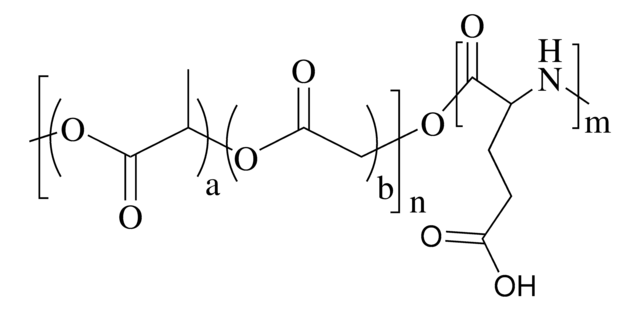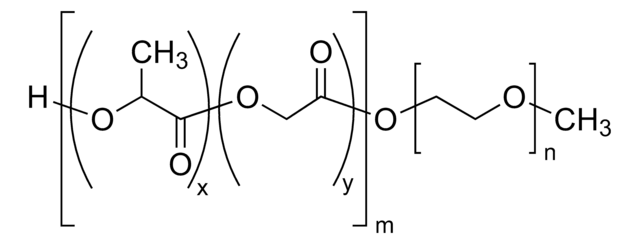900662
Poly(D,L-lactide-co-glycolide)(85/15)-b-poly(ethylene glycol)-carboxylic acid
5k-13k
Sinónimos:
PLGA-PEG, PLGA-PEG Carboxylic acid diblock copolymer, PLGA-PEG-COOH, PLGA-b-PEG
Iniciar sesiónpara Ver la Fijación de precios por contrato y de la organización
About This Item
Fórmula lineal:
HO(CH(CH3)COO)x(CH2COO)y(CH2CH2O)nH
UNSPSC Code:
12352106
NACRES:
NA.23
Productos recomendados
Application
Biocompatible, amphiphilic block copolymer composed of a hydrophilic PEG block and a hydrophobic Poly(lactide-co-glycolide) (PLGA) block, functionalized with a terminal carboxylic acid. These materials have been used in control release and nanoparticle formulation for drug delivery applications. Well-defined materials with varying properties can be prepared by controlling the relative length of each polymer block. Additionally, the ratio of lactide to glycolide can be tuned to control rate of degradation. Carboxylic acid termination allows for facile further chemical modification of these materials.
Storage Class
11 - Combustible Solids
wgk_germany
WGK 3
flash_point_f
Not applicable
flash_point_c
Not applicable
Elija entre una de las versiones más recientes:
Certificados de análisis (COA)
Lot/Batch Number
¿No ve la versión correcta?
Si necesita una versión concreta, puede buscar un certificado específico por el número de lote.
¿Ya tiene este producto?
Encuentre la documentación para los productos que ha comprado recientemente en la Biblioteca de documentos.
Los clientes también vieron
Miles A Miller et al.
Nature communications, 6, 8692-8692 (2015-10-28)
Therapeutic nanoparticles (TNPs) aim to deliver drugs more safely and effectively to cancers, yet clinical results have been unpredictable owing to limited in vivo understanding. Here we use single-cell imaging of intratumoral TNP pharmacokinetics and pharmacodynamics to better comprehend their
Jijin Gu et al.
Molecular pharmaceutics, 12(8), 2889-2903 (2015-06-24)
The goal of this study was to develop and characterize a novel intravaginal film platform for targeted delivery of small interfering RNA (siRNA)-loaded nanoparticles (NP) to dendritic cells as a potential gene therapy for the prevention of sexually transmitted human
Soroush Ardekani et al.
Scientific reports, 5, 16258-16258 (2015-11-21)
Nitroglycerin (NTG) markedly enhances nitric oxide (NO) bioavailability. However, its ability to mimic the anti-inflammatory properties of NO remains unknown. Here, we examined whether NTG can suppress endothelial cell (EC) activation during inflammation and developed NTG nanoformulation to simultaneously amplify
Nuestro equipo de científicos tiene experiencia en todas las áreas de investigación: Ciencias de la vida, Ciencia de los materiales, Síntesis química, Cromatografía, Analítica y muchas otras.
Póngase en contacto con el Servicio técnico







